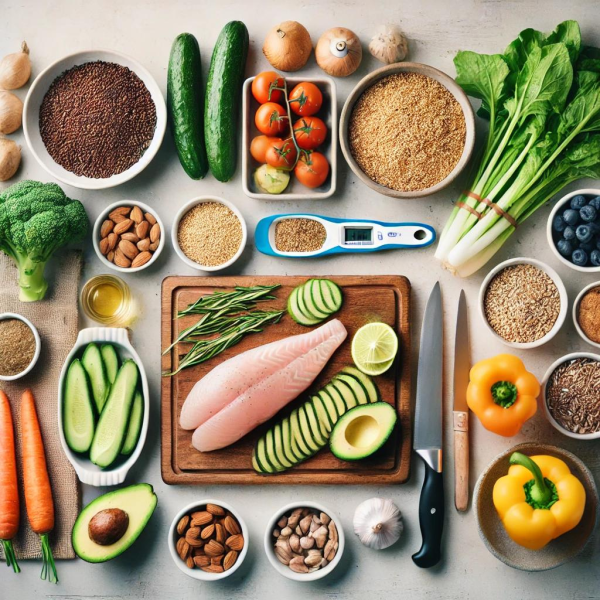Diet for Diabetic Patients
Managing Diabetes Through Diet: A Comprehensive Guide

Introduction
Diet plays a crucial role in managing diabetes, helping maintain stable blood sugar levels and overall health. Understanding the right dietary choices can make a significant difference in your diabetes management journey. In this blog, we explore essential dietary guidelines, tips, and strategies for diabetic patients.

Understanding Diabetes and Its Dietary Implications
What is Diabetes?
Diabetes is a chronic condition where the body either cannot produce enough insulin or cannot effectively use the insulin it produces. This leads to elevated blood sugar levels. The two main types of diabetes are Type 1 and Type 2. Proper diet management is vital for both types to control blood sugar levels and prevent complications.
Key Dietary Principles for Diabetic Patients
Balanced Macronutrients
A balanced diet consisting of carbohydrates, proteins, and fats is essential. However, the type and quantity of each macronutrient matter significantly for diabetic patients.
- Carbohydrates: Choose complex carbohydrates like whole grains, vegetables, and legumes that have a lower glycemic index.
- Proteins: Include lean protein sources such as fish, chicken, tofu, and legumes.
- Fats: Opt for healthy fats from sources like avocados, nuts, seeds, and olive oil.
Portion Control
Monitoring portion sizes helps in managing blood sugar levels. Eating smaller, more frequent meals can prevent spikes in blood glucose levels.
Fiber-Rich Foods
High-fiber foods such as vegetables, fruits, whole grains, and legumes help slow down glucose absorption, aiding in blood sugar control.
Recommended Foods for Diabetic Patients
Vegetables
Non-starchy vegetables like leafy greens, broccoli, peppers, and cucumbers are excellent choices due to their low impact on blood sugar levels.
Fruits
While fruits contain natural sugars, opting for low-glycemic fruits like berries, apples, and pears in moderation is beneficial.
Whole Grains
Whole grains such as quinoa, brown rice, oats, and barley provide essential nutrients and have a lower glycemic index compared to refined grains.
Lean Proteins
Incorporate lean proteins such as chicken, turkey, fish, eggs, and plant-based proteins like tofu and beans.
Healthy Fats
Healthy fats from avocados, nuts, seeds, and olive oil can improve heart health and provide sustained energy.
Foods to Limit or Avoid
Sugary Foods and Beverages
Avoid foods high in added sugars like candies, pastries, sodas, and sugary drinks.
Refined Carbohydrates
Limit intake of white bread, white rice, pasta, and other refined grains that can cause rapid spikes in blood sugar.
Trans Fats
Avoid trans fats found in many processed and fried foods as they increase the risk of heart disease.
High-Sodium Foods
Excessive sodium can lead to hypertension, so it’s best to limit processed and packaged foods high in sodium.
Tips for Healthy Eating Habits
Plan Your Meals
Plan and prepare meals ahead of time to ensure balanced nutrition and prevent unhealthy snacking.
Read Food Labels
Understanding food labels helps in making informed choices. Look for fiber content, sugar levels, and carbohydrate counts.
Stay Hydrated
Drink plenty of water throughout the day. Avoid sugary drinks and opt for herbal teas or water infused with fruits for flavor.

Conclusion
Managing diabetes through diet is about making informed food choices and adopting healthy eating habits. By focusing on balanced nutrition, portion control, and choosing the right foods, diabetic patients can achieve better blood sugar control and overall well-being.
At our clinic, we are committed to providing comprehensive diabetes care and support to help you manage your condition effectively. We believe in empowering our patients with the knowledge and tools they need for a healthier, more balanced life.
F.A.Q

Diabetic patients should avoid foods high in added sugars, refined carbohydrates, trans fats, and high-sodium processed foods. Examples include candies, pastries, white bread, sugary drinks, and fried foods.
Diabetic patients should opt for low-glycemic fruits such as berries, apples, and pears in moderation. They should avoid or limit high-glycemic fruits like watermelon, pineapple, and mangoes, as they can cause rapid spikes in blood sugar levels.
Portion control is very important for managing diabetes. Eating smaller, more frequent meals helps maintain stable blood sugar levels and prevents overeating, which can lead to blood sugar spikes.
Yes, diabetic patients can eat carbohydrates, but they should choose complex carbohydrates with a low glycemic index, such as whole grains, vegetables, and legumes. These carbohydrates are absorbed more slowly, leading to a gradual rise in blood sugar levels.
Healthy snack options for diabetic patients include:
- Raw vegetables with hummus
- A small handful of nuts
- Greek yogurt with berries
- Sliced apple with peanut butter
- Cottage cheese with cucumber slices
Diabetic patients should aim for at least 25-30 grams of fiber per day from a variety of sources, including vegetables, fruits, whole grains, and legumes. Fiber helps slow the absorption of sugar and improve blood sugar control.
